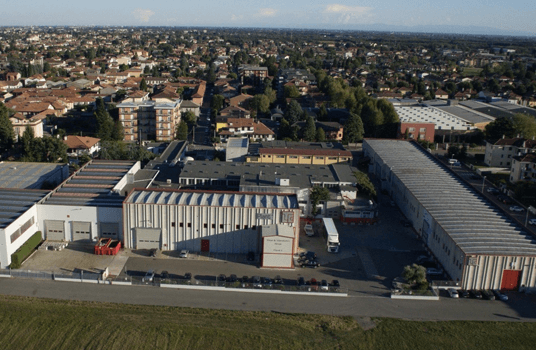
LTC Group gains flexibility thanks to an upgrade to Dynamics 365 Business Central
Directeur, LTC Group
Challenges
- ERP integrated with all business applications
- More flexibility
- Solution scalability
- Simplified user experience
- Solution replication
Results
- Response times reduced to a minimum
- Unique integrated central system
- Powerful and future-proof technological platform
- Perfect management of change
- Speed of business management


Solution & technology
The Legnano Teknoelectric Company (LTC) are an Italian family business, established and led by the Bertelli family, and have been operating in the magnetic sheet metal manufacturing sector, producing magnetic nuclei for electric transformers for more than 60 years. The company manage the entire production cycle, from purchasing raw materials to creating the finished product. LTC employ a staff of over 500 across six different production sites, five of which are based in Milan’s metropolitan area, Legnano, and one, the latest addition, based in Dubai, in the United Arab Emirates.
For a company like LTC, in today’s world, growth and innovation are dependent on the stability and flexibility of their ERP processes. The Lombardian company’s philosophy is built on the cornerstones of investing in people and creating top-quality products, and to enable them to support these core values while taking advantage of technological innovation, they needed to be able to entrust their business to a management system that would allow them to integrate existing business applications while offering them the flexibility to grow as business needs dictate.
Gianluigi Bertelli is one of the directors at LTC, and it was precisely with flexibility in mind that he approached Cegeka about implementing the Microsoft Dynamics NAV solution.
“When I encountered Cegeka and we crossed over to NAV,” Bertelli explains, “I did it with the knowledge that the roadmap designed by Microsoft was in full harmony with our company philosophy. That is to say: maintenance of interoperability in time, guaranteed flexibility and above all, integration with the entire Microsoft environment.”
The continuity guaranteed by the Microsoft roadmap was paramount to convincing LTC to upgrade to the most recent version of the ERP solution, Microsoft Dynamics 365 Business Central, which was implemented by Cegeka. But continuity was not the only reason.
Bertelli continues: “The plan to pass to Business Central was a precise strategic move for us. We already have many different tools within the company, and we have always chosen the best solution for each specific environment, regardless of the brand. Now that we have implemented Business Central, it will enable us not only to automate many manual activities but also to facilitate and increase the exchange of information between different and future solutions.”
The virtual factory
By paying attention to their digital development, LTC have shown vision that is not just limited to the periodic updating of company applications but one that is looking ahead in a long-term, strategic approach that will embrace the Cloud and the scalability of processes. Bertelli explains. “The concept of a virtual factory is a novel one that has not always been easy to define in the company. Obviously, when creating products, the actual production of goods takes place a physical environment and raw materials must be kept at hand near the machines… but there are many other parts of the service we offer that can be virtualised and/or go remote. But the beauty of having a fully functional ERP system that is 100% ready and operational is this: if tomorrow morning I wanted to open a production unit in any part of the world, apart from obvious things like the speed of implementation or the minor physical difficulties we would encounter, I would be able to activate our ERP system immediately and rest assured that all the functionality is fully transferrable to our new sites. Moreover, the transfer of know-how from one site to another has been rendered much simpler, and the amount of time that we dedicated to the training of personnel has been drastically reduced.”

Ivan Chillon, IT manager of LTC, agrees. He is convinced that going for complete integration was the only possible choice.
“There is a desire to consolidate operations at one unique central point. In this sense, I believe that Business Central was the obvious choice for the job. If I think, for example, of the various applications within Office 365 or Business Intelligence, in all their entirety, that we have implemented here with our own know-how, or even part of SharePoint at home, together with an entire range of other applications, it leads me to believe that by integrating Business Central, all the current solutions that we have put in place can give us so much more. We already have a large part of our services based in the Cloud, harmonising maximum integration with a unique platform, but we are also convinced that we need a great data centre within the company too. Therefore, the hybrid Cloud is the obvious choice for us. Our choice has also been dictated by necessity – the complete renewal of our infrastructure, from Italy to Dubai, with the latest technological systems – in other words, we were implementing a hyper-converged infrastructure.
Within this digital context, Microsoft Dynamics 365 Business Central is validated as a solid company management system that enables a 360° view of all company operations. It is a scalable and flexible system that can be easily adapted in accordance with any external constraints. The company can manage their own internal strategy, according to their particular internal circumstances and variables, but at the same time can rely on the solidity of a management system such as Business Central that can manage external variables flexibly and quickly, responding to requests in a continually changing market.”
The ERP of the future
What is expected of Business Central? Bertelli explains:
We were looking for a user experience that simplifies work tools so that we have a platform that reflects the unique nature of the operational side of things and that is comprised of many different, specialised smaller elements. We ourselves also need to be clever in knowing how to fully exploit the solution’s potential. Regarding the design of the system, I don’t just think of offices and IT applications but also of our production processes and of the future that we can expect to see in the IoT environment. In 2022 I am predicting an explosion of IoT services; I am referring to technology like 5G which will become available to companies and allow them to connect all types of sensors and all detectors within the manufacturing process that will start to replace traditional information exchange channels that we have had up until today. I can envision a new factory with new processes and I am sure that Business Central will have a very important part to play here, but at the same time will be fundamental in expanding the professionalism and skills within the company. We are continually growing and changing. All our recent investments in company assets are rated Industry 4.0 compliant and this is the path to continuous evolution.”
When working with the Lombardian manufacturing company, Cegeka developed a process of envisioning and designing solutions with LTC, making the most of the Microsoft world and adopting a process-oriented approach. The aim was to design a plan that could then be replicated as and when necessary, easily cloned across company sites all over the world.
The challenges
Change management is one of the most complex aspects of any project, especially when it is a matter of introducing new technology and more efficient working methods. Resistance to change by personnel is a common factor but, as expected, this resistance tends to be underestimated, bringing often weighted consequences. “The most difficult thing to obtain is a change of mentality,” the managing director continues, “to accompany people through the process of change… essentially, the human part of things. Thanks to Cegeka and their skills, we were successful in better managing all of these challenges and getting over this resistance to change, which was perhaps the biggest obstacle we faced in moving forward. Another obstacle that we encountered was, with the increase of availability all of these tools, a need for more defined IT skills within the company. Skills linked to various sectors… I am not just talking about the IT skills of developers but also those of our end users. I am convinced that between the email services, Power BI, NAV, Microsoft Planner, Workflow tools and others that we are using, we were only accessing about 8% of their functionality in comparison with the potential functionality that they can offer us. Because people often do not know how to make the most of the tools that they are using every day. This is a common problem, but another big challenge.”
Ivan Chillon confirms this state of affairs. “The phrases ‘We have always done it like this’ and ‘It is impossible’ have been banned in all our offices,” he says. According to Ivan, the majority of tools are pretty much useless if not used correctly, and it is for this reason that LTC have also invested in system training for all their employees.
The added value
And what of the added value that comes from upgrading to Business Central?
That would be in the proactive role held by Cegeka from start to finish of the operation.
“I don’t want a supplier who just says to me, ‘Tell me what you want and I’ll do it.’” Gianluigi Bertelli concludes. “Because I don’t see that supplier giving me any added value. What I really need is a partner who shows me the best route forward and gives me the material benefit of instructing me on how to use the tools that have been provided in accordance with our needs. Cegeka is that partner. From our inventory to the production of spare parts, we are sure that because of the complete integration of the Office 365 package, it will now be possible to obtain better performance in terms of data analysis. Moreover, because this is a web-based system, we can count on better flexibility and transmission across the factory.
Cegeka have also developed a vision and a solutions design project with LTC, making the most of the Microsoft world and adopting a process-oriented approach. The aim has been to design a project that could then be easily replicated, essentially one that could be cloned for any of our company sites all over the world.
Do you have a question about this customer story or are you wondering what Microsoft Dynamics 365 Business Central can bring your company?
Let us know. We are happy to think along with you.




